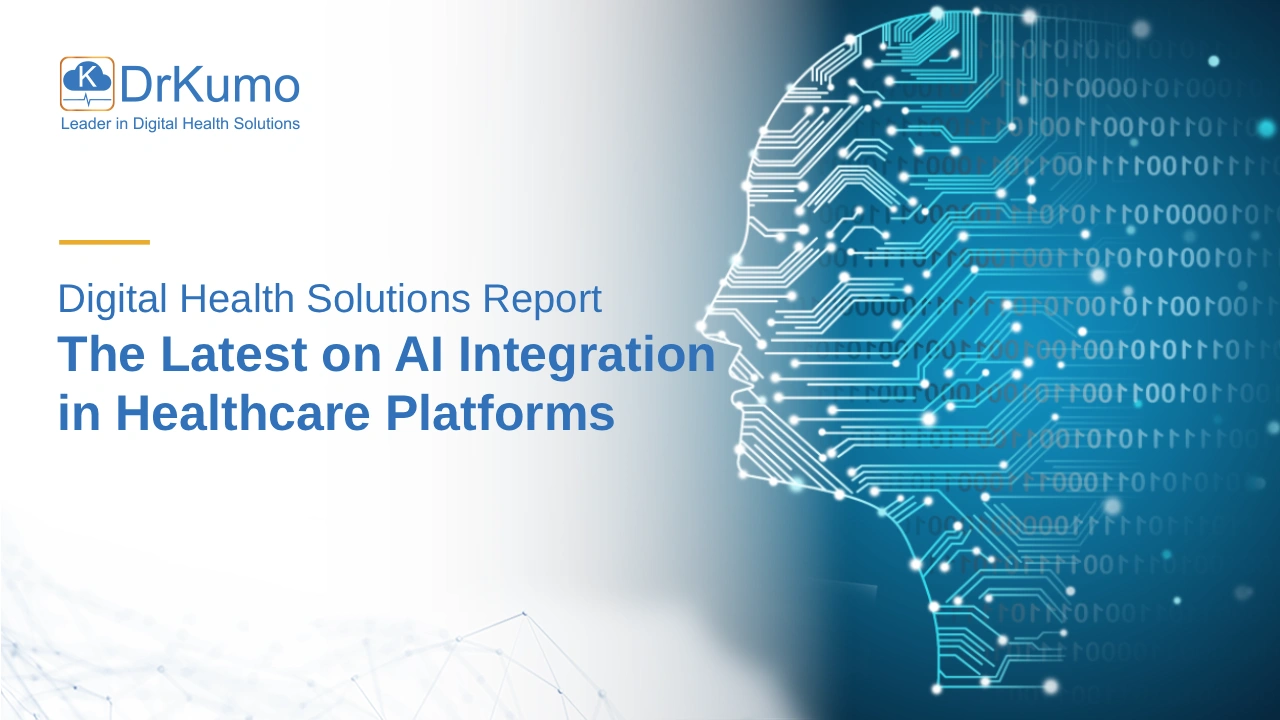Integrating Artificial Intelligence (AI) in healthcare platforms revolutionizes the entire healthcare ecosystem. Digital health solutions powered by AI are enhancing patient diagnosis, treatment plans, drug development, and even administrative processes. This article explores the present state of AI integration in healthcare, looking into its advantages, challenges, and future possibilities.
The Rise of AI in Healthcare
AI is increasingly being recognized as a valuable tool as the healthcare industry grapples with the need for greater efficiency and precision in areas like Remote Patient Monitoring (RPM). Over the past decade, remarkable progress in machine learning, natural language processing, and sophisticated data analysis has transformed AI from a mere conceptual notion into a tangible and practical tool supporting patient care through applications such as real-time monitoring, clinical decision support, and operational optimization.
A recent report from GlobeNewswire projects substantial growth in the global AI in healthcare market. The market is anticipated to reach approximately USD 613.81 billion by 2034, a significant increase from the estimated USD 36.96 billion in 2025, representing a robust Compound Annual Growth Rate (CAGR) of 36.83% between 2025 and 2034. This rapid and significant growth clearly indicates AI’s transformative potential to drive substantial improvements in healthcare outcomes and operational efficiencies.
Applications of AI in Healthcare
AI’s impact on healthcare is vast and transformative, revolutionizing nearly every facet of patient care and administrative operations. Beyond enhancing diagnostic capabilities and accelerating drug discovery, AI is making significant strides in personalized medicine, where algorithms analyze individual patient data – including genomics, lifestyle, and medical history – to tailor treatments for optimal outcomes. For instance, AI-powered tools are being used to predict patient responses to specific therapies in oncology, leading to more effective and targeted interventions.
Moreover, AI is proving invaluable in RPM, with wearable devices and AI algorithms continuously analyzing physiological data to detect anomalies and provide timely alerts, potentially preventing hospitalizations and enabling proactive care.
The administrative side of healthcare is also being reshaped by AI. Natural language processing and machine learning are streamlining tasks such as medical coding, insurance claim processing, and appointment scheduling, reducing administrative burdens and improving efficiency.
AI is a transformative force in healthcare, enabling a shift from reactive to proactive, predictive, and preventive care models. AI-powered clinical decision support systems provide physicians and healthcare professionals with real-time and predictive analytics, enhancing their decision-making capabilities, elevating the quality of care, and ultimately leading to improved patient outcomes.
Enhanced Diagnosis and Imaging
AI technologies are transforming diagnostic accuracy and efficiency in healthcare. Machine learning algorithms demonstrate remarkable capabilities in analyzing medical imaging data from X-rays, MRIs, and CT scans with speed and precision that often surpasses human capabilities. Emerging AI technologies, when validated in controlled studies and regulatory-approved applications, have demonstrated the potential to support radiologists by improving diagnostic workflows and highlighting potential abnormalities for review. For instance, in one study, AI demonstrated a higher sensitivity compared to radiologists in identifying certain abnormalities. This capability acts as a crucial “second set of eyes” for radiologists, significantly minimizing the potential for human error and accelerating the overall diagnosis timeline.
The application of AI extends to various critical areas within medical imaging. AI-powered systems have demonstrated high accuracy in classifying brain tumors in controlled research settings. In breast cancer detection, AI algorithms analyzing mammograms have shown the potential to identify more cases than traditional screening methods. Furthermore, AI is being implemented to detect subtle indicators of diseases like tuberculosis in chest X-rays and to identify risk ratios for conditions like Amyotrophic Lateral Sclerosis (ALS) from image analysis.
Precision Medicine
Precision medicine, an innovative approach to disease treatment and prevention, meticulously tailors interventions to an individual’s unique genetic makeup, lifestyle, and environmental factors. Artificial intelligence plays a pivotal role in this field by efficiently processing and analyzing the vast and complex datasets generated from genomics, proteomics, transcriptomics, and other ‘omics’ fields. AI algorithms can identify intricate patterns and correlations within this data, enabling the selection of the most effective treatment strategies for individual patients. For instance, AI is being utilized to predict a patient’s response to specific cancer therapies based on their tumor’s genetic profile, leading to more targeted and successful outcomes.
Furthermore, AI significantly accelerates the discovery of novel biomarkers – measurable indicators of biological states or conditions. By analyzing large-scale biological datasets, AI algorithms can identify subtle molecular signatures that may predict disease risk, progression, or treatment response. This capability is crucial for developing targeted therapies with enhanced efficacy and fewer side effects, as these therapies can be designed to interact specifically with the identified biomarkers. Several pharmaceutical and biotechnology companies are actively exploring AI in biomarker discovery to accelerate drug development and inform personalized treatment strategies in research settings for diseases like cancer, Alzheimer’s, and autoimmune disorders.
AI in Drug Discovery
The conventional drug discovery process is lengthy and expensive, frequently requiring nearly ten years and billions in costs to launch a new medication. AI simplifies this procedure by forecasting how drug compounds engage with biological targets. More companies are using AI to identify promising drug candidates significantly faster than traditional methods allow. These advances have the potential to streamline early-stage drug discovery, which could contribute to faster candidate identification and improved cost-efficiency in research and development.
Administrative Efficiency
Beyond clinical applications, AI is transforming administrative tasks in healthcare settings. AI-driven solutions automate scheduling, patient follow-ups, and paperwork, reducing administrative burdens. Chatbots and virtual assistants also enhance patient engagement by answering common questions and facilitating appointment management, allowing healthcare personnel to focus more on patient care.
The Benefits of AI in Healthcare
The integration of AI into healthcare platforms brings numerous advantages. Primarily, it improves the accuracy of diagnostic processes, ensuring patients receive timely and correct diagnoses. Additionally, AI enhances patient outcomes through personalized treatment plans, reducing the trial-and-error nature of traditional approaches.
AI also increases accessibility to expert medical advice, particularly in underserved areas. Remote AI-powered diagnostic tools enable healthcare delivery in regions lacking specialist care. Furthermore, AI streamlines operational efficiencies within healthcare systems, potentially reducing costs and improving patient experience. In addition, AI-powered platforms can support Chronic Care management by enabling continuous monitoring and data-driven insights for patients with long-term conditions.
The Future of AI Integration in Healthcare
The outlook for AI in healthcare is optimistic, as continuous research and development enhance its applications and efficiency. Deep learning and neural network advances are expected to enhance AI’s capabilities further. Moreover, as integration technologies like the Internet of Things (IoT) and 5G deployed, real-time health data processing and analysis will become more sophisticated.
Policymakers, healthcare providers, and technology developers must collaborate to craft robust frameworks for the ethical deployment of AI in healthcare. Training for healthcare professionals in AI literacy will also be crucial to maximize the benefits of these technologies while minimizing risks.
DrKumo: Transforming Healthcare Through Real-Time AI-Powered RPM
One of the standout innovators in this rapidly evolving space is DrKumo, a leader in intelligent RPM solutions. DrKumo’s platform utilizes cutting-edge AI technology to empower healthcare providers with real-time, actionable patient data, enabling timely interventions and personalized care. By combining AI with continuous health monitoring, DrKumo helps bridge the gap between clinical visits, making care more proactive, efficient, and patient-centered.
DrKumo’s platform is designed to meet the security and compliance standards, ensuring patient data is protected at every step. Its AI-driven analytics detect trends and potential risk indicators that may signal health complications, enabling early clinical intervention. This level of foresight enables healthcare professionals to make informed decisions faster, reduce hospital readmissions, and improve overall patient outcomes.
Beyond its advanced technological capabilities, DrKumo enhances care coordination by integrating smoothly with Electronic Health Records (EHRs) and providing user-friendly tools for both patients and clinicians. This reduces manual data entry, improves access to real-time patient data, and supports timely clinical decisions. As a result, providers can better manage high-risk, chronic care populations, while patients stay actively involved in their care plans, contributing to better health outcomes and a more efficient, connected healthcare system.
Takeaways
Integrating AI into healthcare platforms is poised to revolutionize the industry, enhancing diagnostic precision, personalizing treatment, accelerating drug discovery, and streamlining operations. However, careful navigation of ethical and logistical challenges is required to ensure that AI technologies deliver equitable benefits..
As we move forward, harmonizing human expertise and machine intelligence can significantly elevate the standard of global healthcare. With appropriate frameworks and collaborations, AI’s role in healthcare can lead to a healthier and more equitable future, paving the way for a new era of medical science innovation.
Explore how DrKumo Digital Health Solutions leverages AI to enhance patient care and streamline healthcare operations – discover our AI-powered platform today. Contact us now!
Disclaimer: This report, “Digital Health Solutions Report: The Latest on AI Integration in Healthcare Platforms,” is for informational purposes only. It is based on research and analysis available at the time of publication. It should not substitute professional medical advice. Consult qualified healthcare professionals for health concerns or treatment decisions. The publishers and authors do not endorse specific products, services, or treatments mentioned.








